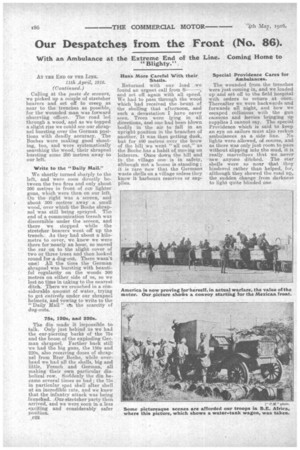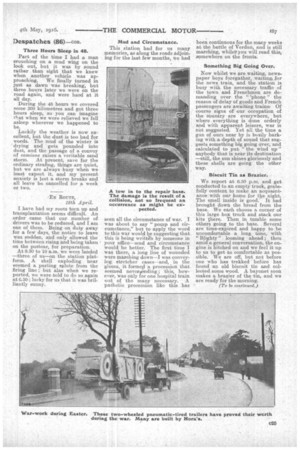Our Despatches from the Front (No. 86).
Page 4

Page 5

If you've noticed an error in this article please click here to report it so we can fix it.
With an Ambulance at the Extreme End of the Line. Coming Home to "Blighty."
AT THE END OF THE LINE- Mk April, 1916. (Continued.) Cain.at the poste de secours, we picked up a couple of stretcher bearers and set off to creep as near to the trenches as possible, for the wounded man was forward observing officer. The road led through a wood, and as we topped a slight rise we colild see our shrapnel bursting over the German positions with deadly accuracy. The Boches were making good shooting, too, and were systematically searching the wood, their shrapnel bursting some 800 metres away to our left.
Write to the "Daily Mail,"
We shortly turned sharply to the left, and were soon directly between the two fires and only about 300 metres in front of otx• lighter guns, which were then on our left. On the right was a screen, and about 300 metresaway a small wood, over which the Boehe shrapnel was still being sprayed. The end of a communication trench was discernible under the screen, and there we stopped while the stretcher bearers went of up the trench. As they had about a kilometre to cover, we knew we were there for nearly an hour, so moved the ear on to the slight cover of two or three trees and then looked round for a dug-out. There wasn't one,! All the time the German shrapnel was bursting with beautiful regularity on the woods 300 metres on either side of us, so we lost no time in taking to the nearest ditch. There we crouched in a considerable amount of water, trying to get entirely under our shrapnel helmets, and vowing to write to the "Daily Mail" ot. the scarcity of dug-outs.
75s, 120s, and 220s.
The din made it impossible to talk. Only just behind us we had the ear-piercing barks of the 75s and the boom of the exploding German shrapnel. Farther back still we had the big guns, the 150s and 220s, also receiving doses of shrapnel from Brer Boche, while overhead we had all the shells, big and little, French and German, all making their own particular diabolical row. Suddenly the din became several times as bad ; the 75s in particular spat shell after shell at an incredible rate, and we knew that the infantry attack was being launched. Our stretcher party then arrived, and we were soon in a less exciting and considerably safer • position. c22
Huns More Careful With their
Returned with our load .we found an urgent call from S and set off again with all speed. We had to pass through the wood which had received the brunt of the shelling that afternoon, and such a devastation I have never seen. Trees were lying in all directions, and one had been blown bodily in the air to fall in an upright position in the branches of another. It was then getting dusk, but for 400 metres over the brow of the hill we went all out," as the Boche has a habit of moving on loiterers. Once down the hill and in the village one is in safety, although not a house is standing ; it is rare now that the Germans waste shells on a village unless they know it harbours reServes or supplies.
Special Providence Cares for Ambulances.
The wounded from the trenches were just coming in, and we loaded up and set off to the field hospital with orders to return at once. Thereafter we were backwards and forwards all night, and how we escaped collisions with . the gun caissons and lorries bringing Up supplies I cannot say. The special Providence -which is said to keep an eye on sailors must also reckon ambulances as a side line. No lights were allowed, of course, and as there was only just room to pass without slipping into the mud, it is really marvellous that we never -saw anyone ditched. The star shells were so near that they hindered rather than helped, for, although they showed the road up, the sudden change from darkness to light quite blinded one Three Hours Sleep in 48.
Part of the time I had a man crouching on a mud wing on the look out, but it was by sound rather than sight that we knew when another vehicle was approaching. We finally turned in just as dawn was breaking, but three hours later we were on the road again, and were hard at it all day.
During the 48 hours we covered some 300 kilometres and got three hours sleep; so you can imagine tliat when we were relieved we fell asleep wherever we happened to be.
Luckily the weather is now excellent, but the dust is too bad for words. The mud of the winter is ' drying and gets pounded into dust, and the passage of a convoy of canzions raises a veritable sand storm. At present, save for the ordinary strafing, things are quiet, but we are always busy when we least expect it, and my present anxiety is lest a storm breaks and all leave be cancelled for a week or two.
'EN ROUTE,
18th April.
I have had my roots torn up and transplantation seems difficult. An order came that our number of drivers was to be reduced, and I am one of them. Being on duty away for a few days, the notice to leave waa sudden, and only allowed the time between rising and being taken on the postear, for preparation.
At 9.30 to 10 a.m. we were landed —three of us—on the station platform. A shell exploding near seemed a parting salute from the firing line ; but alas when we reported, we were told to do so again at 6.30; lucky for us that it was brilliantly sunny. Mud and Circumstance.
This station had for us many memories, as along the roads adjoining for the last few months, we had
seen all the circumstance of war. was about to say "pomp and circumstance," but to apply the word to this war would be suggesting that. this is being written by Someone in your office—mud and. circumstance would be better. The first time I was there, a long line of wounded were marching down—I was conveying stretcher cases—and, in the gloom, it formetl a. procession that. seemed neveramding ; this, however, was only for one hospital train out of the many necessary. A pathetic procession like this has
been continuous for the many weeks at the battle of Verdun, and is still marching, whilst' you will read this, somewhere on the fronts.
Something Big Going Over Now whilst we are waiting, newspaper boys foregather, waitangt for the news train, and the station is busy with the necessary traffic of ' the town and Frenchmen are demanding over the " 'phone " the reason of delay of goods and French passengers are awaiting trains: Of course signs of our occupation of the country are everywhere, but where everything is done orderly and with apparentleisure, war is net suggested. Yet all the time a gun of ours near by is basily barking with depth of sound that suggests something big going over, and calculated to put the wind up " anybody that is near its destination —still, the sun shines gloriously and these shells are going the other way.
Biscuit Tin as Brazier.
We report at 6.30 p.m. and get conducted to an empty truck, gratefully content to make an acquaintance with our home for the night. The smell inside is good. It had brought down the bread from the base. We each choose a corner of this large box truck and stack our kits there. Then in tumble sonic others going .to the base. Several are time-expired and happy to be uncomfortable a long time, with " Blighty " looming ahead ; then amid a general conversation, the engine is hitched on and we feel it up to us to get as comfortable as possible. We are off, but not before one who has trekked before has found an old biscuit tin and collected some wood. A bayonet soon makes a brazier of the tin, and we are ready for the morning.




















